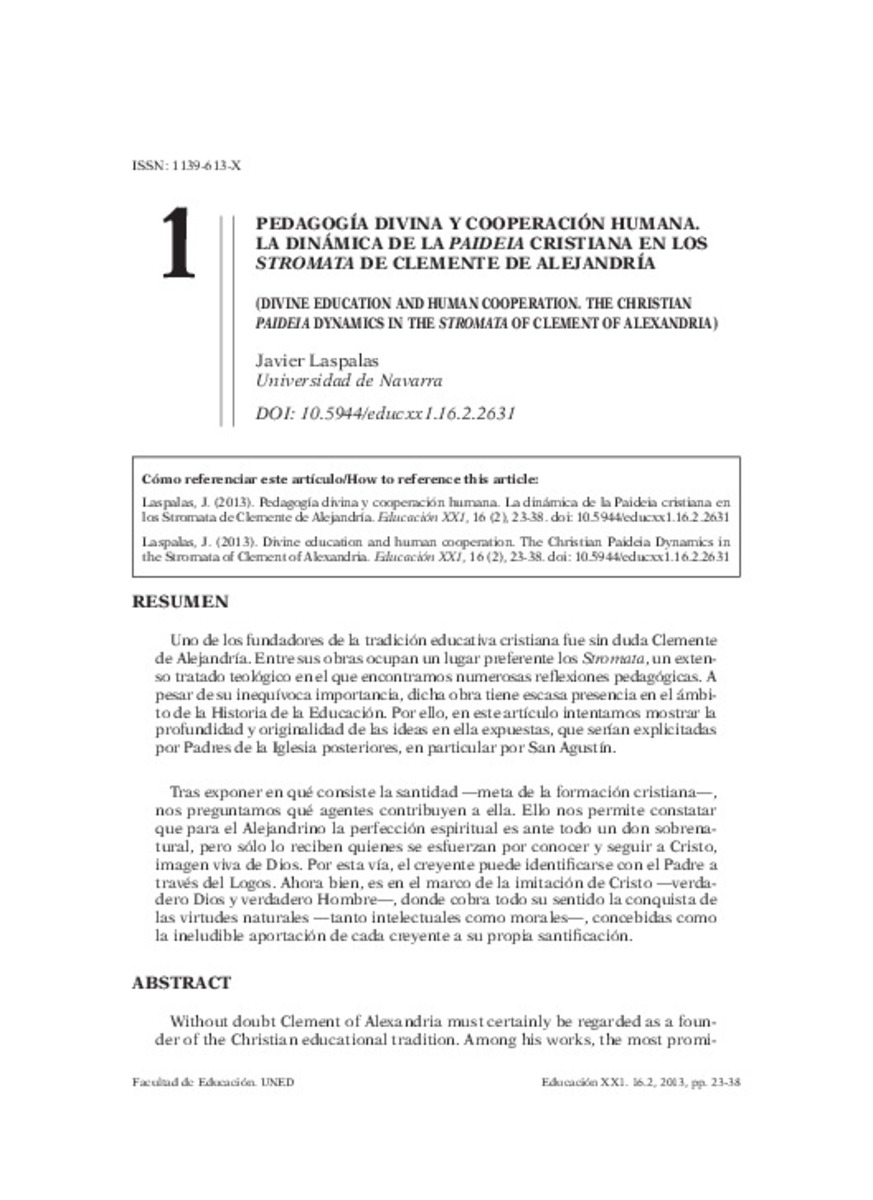Full metadata record
| DC Field | Value | Language |
|---|---|---|
| dc.creator | Laspalas, J. (Javier) | es_ES |
| dc.date.accessioned | 2014-08-12T10:31:02Z | - |
| dc.date.available | 2014-08-12T10:31:02Z | - |
| dc.date.issued | 2013 | es_ES |
| dc.identifier.citation | Laspalas, J. (2013). Pedagogía divina y cooperación humana. La dinámica de la Paideia cristiana en los Stromata de Clemente de Alejandría. Educación XX1, 16 (2), 23-38. | es_ES |
| dc.identifier.issn | 1139-613X | es_ES |
| dc.identifier.uri | https://hdl.handle.net/10171/36300 | - |
| dc.description.abstract | Uno de los fundadores de la tradición educativa cristiana fue sin duda Clemente de Alejandría. Entre sus obras ocupan un lugar preferente los Stromata , un exten - so tratado teológico en el que encontramos numerosas reflexiones pedagógicas. A pesar de su inequívoca importancia, dicha obra tiene escasa presencia en el ámbi - to de la Historia de la Educación. Por ello, en este artículo intentamos mostrar la profundidad y originalidad de las ideas en ella expuestas, que serían explicitadas por Padres de la Iglesia posteriores, en particular por San Agustín. Tras exponer en qué consiste la santidad —meta de la formación cristiana—, nos preguntamos qué agentes contribuyen a ella. Ello nos permite constatar que para el Alejandrino la perfección espiritual es ante todo un don sobrena - tural, pero sólo lo reciben quienes se esfuerzan por conocer y seguir a Cristo, imagen viva de Dios. Por esta vía, el creyente puede identificarse con el Padre a través del Logos. Ahora bien, es en el marco de la imitación de Cristo —verda - dero Dios y verdadero Hombre—, donde cobra todo su sentido la conquista de las virtudes naturales —tanto intelectuales como morales—, concebidas como la ineludible aportación de cada creyente a su propia santificación | es_ES |
| dc.description.abstract | Without doubt Clement of Alexandria must certainly be regarded as a founder of the Christian educational tradition. Among his works, the most prominent is an extended theological treatise, entitled Stromata, full of educational passages. In spite of its doubtless relevance, this book has a limited presence in the studies on the educational past. Hence, in this paper we intend to show the depth and originality of its content, because many of his ideas were later developed by other Fathers of the Church, especially Saint Augustine. In our article, we first explain the nature of holiness —the goal of Christian education— and then we proceed to examine the functions of the agents which contribute to it. Thus we can show that in Clements» theory of education, spiritual perfection is primarily a divine gift, but only accessible through an effort to know and follow Christ, true image of God. In this manner it is possible for the believer to identify himself with the Father in the Logos. Nevertheless, it is precisely in the aim of this imitation of Christ —perfect God and perfect Man— that the conquest of natural virtues —both intellectual and moral— acquires all its meaning, intended as an essential contribution of each believer to his personal quest for holiness. | en_EN |
| dc.language.iso | spa | es_ES |
| dc.rights | info:eu-repo/semantics/openAccess | es_ES |
| dc.subject | Clemente de Alejandría | es_ES |
| dc.subject | Educación | es_ES |
| dc.subject | Cristianidad | es_ES |
| dc.subject | Civilización griega | es_ES |
| dc.subject | Stromata | es_ES |
| dc.subject | Paideia griega | es_ES |
| dc.title | Pedagogía divina y cooperación humana. La dinámica de la paideia cristiana en los 'Stromata' de Clemente de Alejandría | es_ES |
| dc.type | info:eu-repo/semantics/article | es_ES |
| dc.type | info:eu-repo/semantics/article | es_ES |
| dc.publisher.place | EDUCACION XXI: REVISTA DE LA FACULTAD DE EDUCACION1623-38 | es_ES |
| dc.identifier.doi | http://dx.doi.org/10.5944/educxx1.16.2.2631 | es_ES |
Files in This Item:
Statistics and impact
Items in Dadun are protected by copyright, with all rights reserved, unless otherwise indicated.






